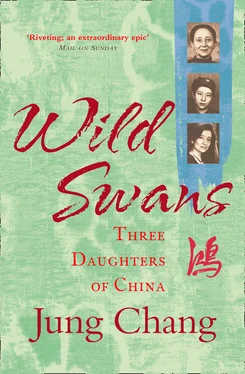The first my grandmother knew of her impending liaison was when her mother broke the news to her a few days before the event. My grandmother bent her head and wept. She hated the idea of being a concubine, but her father had already made the decision, and it was unthinkable to oppose one’s parents. To question a parental decision was considered ‘unfilial’—and to be unfilial was tantamount to treason. Even if she refused to consent to her father’s wishes, she would not be taken seriously; her action would be interpreted as indicating that she wanted to stay with her parents. The only way to say no and be taken seriously was to commit suicide. My grandmother bit her lip and said nothing. In fact, there was nothing she could say. Even to say yes would be considered unladylike, as it would be taken to imply that she was eager to leave her parents.
Seeing how unhappy she was, her mother started telling her that this was the best match possible. Her husband had told her about General Xue’s power: ‘In Peking they say, “When General Xue stamps his foot, the whole city shakes.”’ In fact, my grandmother had been rather taken with the general’s handsome, martial demeanour. And she had been flattered by all the admiring words he had said about her to her father, which were now elaborated and embroidered upon. None of the men in Yixian were as impressive as the warlord general. At fifteen, she had no idea what being a concubine really meant, and thought she could win General Xue’s love and lead a happy life.
General Xue had said that she could stay in Yixian, in a house which he was going to buy especially for her. This meant she could be close to her own family, but, even more important, she would not have to live in his residence, where she would have to submit to the authority of his wife and the other concubines, who would all have precedence over her. In the house of a potentate like General Xue, the women were virtual prisoners, living in a state of permanent squabbling and bickering, largely induced by insecurity. The only security they had was their husband’s favour. General Xue’s offer of a house of her own meant a lot to my grandmother, as did his promise to solemnize the liaison with a full wedding ceremony. This meant that she and her family would have gained a considerable amount of face. And there was one final consideration which was very important to her: now that her father was satisfied, she hoped he would treat her mother better.
Mrs Yang suffered from epilepsy, which made her feel undeserving towards her husband. She was always submissive to him, and he treated her like dirt, showing no concern for her health. For years, he found fault with her for not producing a son. My great-grandmother had a string of miscarriages after my grandmother was born, until a second child came along in 1917—but again, it was a girl.
My great-grandfather was obsessed with having enough money to be able to acquire concubines. The ‘wedding’ allowed him to fulfil this wish, as General Xue lavished betrothal gifts on the family, and the chief beneficiary was my great-grandfather. The gifts were magnificent, in keeping with the general’s station.
On the day of the wedding, a sedan chair draped with heavy, bright-red embroidered silk and satin appeared at the Yangs’ house. In front came a procession carrying banners, plaques, and silk lanterns painted with images of a golden phoenix, the grandest symbol for a woman. The wedding ceremony took place in the evening, as was the tradition, with red lanterns glowing in the dusk. There was an orchestra with drums, cymbals, and piercing wind instruments playing joyful music. Making a lot of noise was considered essential for a good wedding, as keeping quiet would have been seen as suggesting that there was something shameful about the event. My grandmother was splendidly dressed in bright embroidery, with a red silk veil covering her head and face. She was carried in the sedan chair to her new home by eight men. Inside the sedan chair it was stuffy and boiling hot, and she discreetly pulled the curtain back a few inches. Peeping out from under her veil, she was delighted to see people in the streets watching her procession. This was very different from what a mere concubine would get—a small sedan chair draped in plain cotton of the unglamorous colour of indigo, borne by two or at the most four people, and no procession or music. She was taken right around the town, visiting all four gates, as a full ritual demanded, with her expensive wedding gifts displayed on carts and in large wicker baskets carried behind her. After she had been shown off to the town, she reached her new home, a large, stylish residence. My grandmother was satisfied. The pomp and ceremony made her feel she had gained prestige and esteem. There had been nothing like this in Yixian in living memory.
When she reached the house General Xue, in full military dress, was waiting, surrounded by the local dignitaries. Red candles and dazzling gas lamps lit up the centre of the house, the sitting room, where they performed a ceremonial kowtow to the tablets of Heaven and Earth. After this, they kowtowed to each other, then my grandmother went into the wedding chamber alone, in accordance with the custom, while General Xue went off to a lavish banquet with the men.
General Xue did not leave the house for three days. My grandmother was happy. She thought she loved him, and he showed her a kind of gruff affection. But he hardly spoke to her about serious matters, in keeping with the traditional saying: ‘Women have long hair and short intelligence.’ A Chinese man was supposed to remain reticent and grand, even within his family. So she kept quiet, just massaging his toes before they got up in the morning and playing the qin to him in the evening. After a week, he suddenly told her he was leaving. He did not say where he was going—and she knew it was not a good idea to ask. Her duty was to wait for him until he came back. She had to wait six years.
In September 1924, fighting erupted between the two main warlord factions in North China. General Xue was promoted to deputy commander of the Peking garrison, but within weeks his old ally General Feng, the Christian warlord, changed sides. On 3 November, Tsao Kun, whom General Xue and General Feng had helped install as president the previous year, was forced to resign. The same day the Peking garrison was dismissed, and two days later the Peking police office was disbanded. General Xue had to leave the capital in a hurry. He retired to a house he owned in Tianjin, in the French concession, which had extraterritorial immunity. This was the very place to which President Li had fled the year before when Xue had forced him out of the presidential palace.
In the meantime my grandmother was caught up in the renewed fighting. Control of the northeast was vital in the struggle between the warlord armies, and towns on the railway, especially junctions like Yixian, were particular targets. Shortly after General Xue left, the fighting came right up to the walls of the town, with pitched battles just outside the gates. Looting was widespread. One Italian arms company appealed to the cash-strapped warlords by advertising that it would accept ‘lootable villages’ as collateral. Rape was just as commonplace. Like many other women, my grandmother had to blacken her face with soot to make herself look filthy and ugly. Fortunately, this time Yixian emerged virtually unscathed. The fighting eventually moved south and life returned to normal.
For my grandmother, ‘normal’ meant finding ways to kill time in her large house. The house was built in the typical North Chinese style, around three sides of a quadrangle, the south side of the courtyard being a wall about seven feet high, with a moon gate which opened onto an outer courtyard, which in turn was guarded by a double gate with a round brass knocker.
Читать дальше












